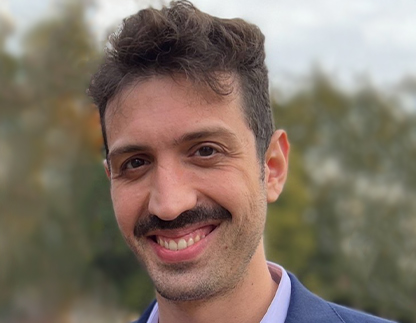Achieving goals is not about rigidly following a plan, but rather about adapting to unforeseen situations.”
Michalis Mamakos
Postdoctoral Fellow in the Center for Enlightened Disagreement in the Kellogg School of Management

Michalis Mamakos is a postdoctoral fellow in the Center for Enlightened Disagreement in the Kellogg School of Management. His research focuses on understanding and navigating conflicts within complex social structures. Michalis combines psychological theory with computational methods, using large language models to depolarize cross-party political conversations.
How would you describe your research and/or work to a non-academic audience?
My research seeks to understand and constructively navigate conflict.
Diversity of perspectives broadens intellectual horizons, but it also gives rise to detrimental conflicts. For example, over 60% of Americans find it stressful to talk politics with people they disagree with. Thus, when disagreement is mismanaged, the advantages of intellectual diversity can turn into disadvantages. My research first examines what drives conflict in complex social structures, such as political polarization on social media. It then focuses on designing online platforms for effective communication by constructively navigating disagreements.
What have been some of the most memorable twists and turns of your career?
In my fourth year as a PhD student in computer science, I signed up out of curiosity for a course in psychology. Little did I know that this would define my academic trajectory. This course sparked an interest in me that eventually led to doing my thesis on the intersection of computer science and psychology. This is a direction that I now identify with and that I happily pursue.
What is a mistake you have learned from in your career?
My experiences taught me to not get disappointed when things do not instantly go my way. A failed attempt is a piece of information to learn from. Sometimes it signals that more effort is needed, which should be seen as a challenge to overcome rather than a defining obstacle. Other times it informs us that we need to readjust our plans, which should be seen as making a step forward rather than backwards. In all cases, a failed attempt is something to learn from, and our ability to constructively interpret it improves with experience.
What do you find both rewarding and challenging about your research and/or work?
What I find both rewarding and challenging about my research is coming up with solutions to problems where opposing sides struggle to see eye-to-eye. These are problems that heavily affect the lives of everyday citizens. The inherent difficulty of these problems is tied to their societal impact, making it incredibly rewarding when progress is made toward resolving them.
What is the biggest potential impact or implication of your work?
The biggest potential impact of my work is enabling the marketplace of ideas to advance society through the diversity of perspectives. This requires creating spaces where people with different viewpoints feel equally free to speak their minds. It is when we see alternative perspectives as missing pieces of a common puzzle that our differences can unite rather than divide us.
Tell us about a time when things did not go as you planned, what did you learn?
The beginning of my studies as an international graduate student was no bed of roses. There were many difficulties I had to adjust to, from the requirements at school to socializing out of it. Through my struggles, I learned many things. Achieving goals is not about rigidly following a plan, but rather about adapting to unforeseen situations. It is a combination of persistence and adaptability that finally leads to the original goal.
Publish Date: September 3, 2024
If you know a graduate student, postdoctoral scholar, graduate faculty member, staff member, or a member of our TGS alumni population who would make a great candidate for our TGS Spotlight Series, please complete this brief TGS Spotlight Series Nomination Form.